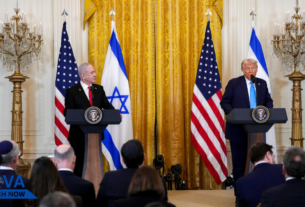The Trump administration imposed new sanctions on Iran’s oil network on February 6, 2025, marking its first penalties since taking office. The sanctions aim to cut off Iran’s oil exports and reduce the country’s revenue from crude sales.
US officials stated that the sanctions target individuals and entities involved in Iran’s oil trade. Donald Trump reiterated his commitment to “maximum pressure” on Tehran, stressing that the US will continue to take strong actions against Iran’s economy.
These measures are part of a broader strategy to curb Iran’s influence in the Middle East. The sanctions specifically focus on companies and individuals who assist Iran in selling oil to countries like China and Syria, both of which are key buyers of Iranian crude.
The US has been intensifying its efforts to isolate Iran economically and politically. The sanctions aim to pressure Tehran into changing its policies, especially regarding nuclear development and regional military activities.
While the US seeks to limit Iran’s ability to export oil, Iran’s government has vowed to continue its oil trade despite the sanctions. Tehran has said that it will find alternative markets for its crude and work around the US restrictions.
The Trump administration has long argued that the sanctions are necessary to stop Iran from financing activities that threaten US allies in the Middle East. The US has accused Iran of supporting militant groups and destabilizing countries in the region.
These new penalties are expected to have significant economic consequences for Iran, which is already facing severe economic difficulties. Iran’s oil exports have dropped sharply due to previous sanctions, and the country’s economy is struggling under heavy US pressure.
In response to the sanctions, Iran has warned of retaliation. Tehran has said it will continue to pursue its interests in the region and will not be intimidated by US actions.
Experts believe that the sanctions are part of a broader effort to force Iran to negotiate a new deal over its nuclear program. The Trump administration has repeatedly criticized the 2015 nuclear deal, which it claims does not do enough to curb Iran’s influence and nuclear ambitions.
The US sanctions are also part of a wider campaign to rally international support against Iran’s policies. The Trump administration has urged countries around the world to join its efforts in isolating Tehran and cutting off its access to global markets.
Despite the challenges, Iran has managed to maintain some of its oil exports by working with other nations that do not follow US sanctions. However, the impact of these new penalties is expected to further strain Iran’s economy.
The Trump administration’s strategy of “maximum pressure” has created tensions with countries that continue to trade with Iran. Nations like China and Russia have resisted US calls to sever ties with Iran, which complicates the US’s efforts to isolate Tehran.
This latest round of sanctions sends a clear message that the US will continue to use economic pressure as a tool to achieve its foreign policy goals. The Trump administration remains determined to push for a new agreement with Iran, one that addresses nuclear concerns and regional security issues.
As the US steps up its campaign against Iran, experts warn that the situation could escalate further. While the sanctions aim to weaken Iran economically, they also risk intensifying the conflict between the US and Tehran.




